
Jack Willis is one of the most influential, beloved and long-serving editorial advisers in the history of The Oklahoma Daily.
Under his mentorship over 14 years, The Daily chronicled the 1995 Oklahoma City bombing and launched the paper’s website, became a nationally recognized force in college media and propelled students to careers around the world. Wherever they went, Jack’s students retained a deep affinity for both the work they did and the adviser they learned from back in Copeland Hall. With his quiet, understated teaching style — in one-on-one conversations, editorial board meetings and famous red-pen markups — he did what the best mentors must: not necessarily provide answers, but illuminate paths to individual learning that pay off in the moment and years later.
In addition to his work in the newsroom, Jack taught a news gathering course as an adjunct professor that came to be known simply as “Jack’s Class” to countless students even after his retirement in 2007. Before coming to OU, he worked for 19 years at the Muskogee Daily Phoenix and Times Democrat, ending his tenure as editor. Before that, he spent 10 years in retail. Throughout his career, the Tahlequah native and 2001 inductee in the Oklahoma Journalism Hall of Fame is remembered for the gift of always putting people — be they customers, readers or students — first.

Karen Wicker has forged a reputation as one of Oklahoma’s top storytellers and built one of Oklahoma’s most successful communication firms.
Karen protects reputations and provides candid counsel using her 30 years of experience. As a television reporter turned public relations practitioner, she gets giddy when conducting media training and excels at turning organizations’ crises into opportunities. Her career in media began with selling ads for The Oklahoma Daily, where she got her first experience talking to business owners and helping them solve problems.
After earning a bachelor’s degree in journalism from OU in 1988 – later followed by a 1997 master’s degree in human relations – Karen developed her reporting skills at OETA and KOTV in Tulsa. She later served as director of external affairs for the Oklahoma State University Center for Health Sciences and as region president for one of Oklahoma’s largest public relations firms. Karen launched her business, Candor, in 2012. Candor is a public relations and marketing firm offering everything from media relations and public affairs to a full range of video, social and digital services. Karen provides senior leadership on every account, drives company strategy and manages a team of professionals at various stages of their careers. Candor has twice been ranked as one of the fastest-growing private companies in Oklahoma City and was named PRSA Oklahoma City’s Firm of the Year in 2018. Karen is active in the community and won a Bronze Stevie as a female entrepreneur of the year in 2016.

Johnny Rard is a 33-year veteran of advertising, working with national and international brands that have included Walmart, McDonald’s, Bayer, USAA, Blockbuster Video, H&R Block, Sprint, Black & Veatch, Russell Stover & Whitman’s Candies and The University of Oklahoma, just to name a few.
He may best be known for his work on two famous icons: Smiley and Walmart. He introduced the concept to Walmart for what was to be a two-year “Rollback” advertising campaign that became a 10-year rebranding for the retail giant and one of the most recognizable branding concepts in retail history. By the end of its run, Smiley was on the backs of more than 1.5 million associates, translated into more than 30 different languages, and had become a mascot for the company. It even was the subject of an unauthorized parody in a marketing poster for an anti-Walmart documentary. Now that’s flattery.
A 1986 graduate of OU, Johnny was a two-time editor of Sooner yearbook, creator of Campus Life magazine and a member of The Oklahoma Daily advertising staff. Following a magazine stint in New York, Johnny moved to Kansas City. Johnny is currently the vice president for brand/communications at Red Door Woodfired Grill in Kansas City.
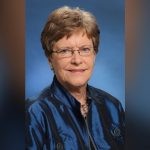
Carol J. Burr had barely finished serving as editor of The Oklahoma Daily when she was appointed editor of Sooner Magazine in 1959.
Over the next four decades, she would become the ultimate curator of OU stories, combining the determination that made her a top student with a righteous blue pen and boundless enthusiasm for her alma mater. Taking the helm brought her into the orbit of her future husband and former Sooner Magazine editor, David A. Burr, then assistant to President George Lynn Cross. The Burrs had a front-row seat to every aspect of university life and worked closely with students, especially those named to the President’s Leadership Class, which David founded in 1961.
Carol took a career hiatus to raise their children, Michael, Kathleen and Thad. In 1980, she accepted the challenge of joining the OU Foundation to bring Sooner Magazine back to life after a six-year publication gap and to edit the book The Sooner Story: Ninety Years at the University of Oklahoma. She was also author and editor of the 1990 book Centennial: A Portrait of the University of Oklahoma. Burr was a 2010 recipient of the Gaylord College of Journalism and Mass Communication Distinguished Alumni Award. She received OU’s Honorary Doctorate Degree in Humane Letters in 2015. Though retired, Carol remains devoted to the university she loves and serves as a trusted adviser to OU President’s Leadership Class alumni.

A champion of small-town newspapers, Ed Livermore Sr. served as advertising manager for The Oklahoma Daily in 1938-39.
The Hobart native met his wife, Melba Hudson, at OU. They graduated with advertising degrees and were married in 1941. After Livermore returned from service in World War II, the couple purchased the Claremore Daily Progress. In 1959, they acquired the Sapulpa Daily Herald. Over the next several years, he acquired more newspapers, including The Edmond Sun and Guthrie Leader. He also owned a radio station in Sapulpa and had interest in a cable company.
In 1972 Livermore became the first Oklahoman to serve as president of the National Newspaper Association. He was the most active president in NNA history, touring the country on behalf of the organization. He served as president of the Oklahoma Press Association in 1959-60 and was inducted into the Oklahoma Journalism Hall of Fame in 1975. Later in life, Ed and Melba supported OU with the creation of the Engleman/Livermore Professorship in Community Journalism, for which they partnered with Charlie and Jean Engleman, another Oklahoma newspaper family and longtime friends. The Livermores had three children, two of whom went on to serve as editor of The Oklahoma Daily. Son Ed Livermore Jr. was editor in 1964 and also worked on the advertising staff. Daughter Sally Livermore Spencer was Daily editor in 1970 and worked for Sooner yearbook. Ed Livermore Sr. died in 2014 at the age of 95.
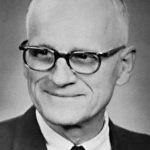
Harold Keith was a Newbery Medal-winning children’s author and the first sports information director at The University of Oklahoma.
Indeed, he was one of the first full-time sports information directors in the nation and can lay claim to being one of the fathers of the profession of sports public relations.
Keith held a 1929 bachelor’s degree and 1939 master’s degree in journalism from OU. He was sports editor of The Oklahoma Daily. His master’s thesis involved interviewing 22 Civil War veterans living in the area, work that would inform his classic of children’s literature, Rifles for Watie. That novel chronicles the experiences of a young Union soldier who crosses enemy lines and serves undercover in Indian Territory under the command of the Cherokee leader and Confederate general Stand Watie. In 1958, the book won the Newbery Medal, the highest award in American children’s literature. It was one of more than a dozen books Keith wrote. He served as OU’s sports publicist and information director from 1930 to 1969. He was the founder of a national association for his peers and colleagues, the College Sports Information Directors association. Keith was inducted into the Oklahoma Sports Hall of Fame in 1987. He died in Norman in 1998 at the age of 94.

Jennifer J. Hicks is head of audience growth at The Wall Street Journal, where she and her team work to reach millions of new readers, viewers and listeners. Previously she served as a deputy managing editor shaping everything from the WSJ’s website and apps to its off-platform initiatives and editorial tools.
Previously, Jennifer served as the Journal’s deputy editor of real-time news. In this role, she executed breaking-news coverage across digital platforms and oversaw the WSJ.com homepage team. She joined the Journal in 2004 and has held a number of editing roles, including a three-year assignment in London leading WSJ.com’s European edition. She played a key role in digital coverage for numerous U.S. elections, the euro-zone debt crisis, the Arab Spring, two Olympic Games, the royal wedding and more. She also is co-editor of the WSJ stylebook. Before joining the Journal, she briefly served as assistant night editor of The Muskogee Phoenix.
Jennifer graduated from the University of Oklahoma in 2002 with degrees in journalism and political science. She was editor-in-chief of The Oklahoma Daily from 2001 to 2002, having previously served as online editor, night editor and managing editor. As an OU student, she interned for The Daily Oklahoman’s Washington bureau and spent two summers as a copy editor for The Boston Globe.
Jennifer earned a master’s degree in journalism from Columbia University in New York in 2003. She has taught graduate journalism courses at Columbia and the City University of New York and recently joined the Gaylord College Board of Visitors at OU.
Jennifer grew up in Norman. She currently lives in Brooklyn, N.Y., with her husband, Anthony.

Hannah Allam, a reporter known for her work on extremism and conflict, covers national security for The Washington Post, where she shared in winning the Pulitzer Prize for Public Service for a project on the Jan. 6 insurrection.
She previously covered national security for National Public Radio, the State Department and national security for the McClatchy Company in Washington, D.C. She was part of the team that won a 2012 George Polk Award for reporting on the complexities of the Syrian civil war.
Hannah went to Baghdad in 2003, became bureau chief for Knight Ridder Newspapers and stayed until 2006, when she opened a Cairo-based Middle East bureau.
In 2008-09, she studied sectarianism in Islam as a Nieman Fellow at Harvard before returning to Egypt to cover the Arab Spring rebellions in 2010-11. In 2004, she was named NABJ’s journalist of the year; in 2015, she chaired the Pulitzer Prize international reporting jury.
Hannah graduated from the University of Oklahoma in 1999, serving as editor-in-chief of The Oklahoma Daily her senior year after working as a reporter and opinion editor and completing internships at The Wichita Eagle, Minneapolis Star Tribune and The Washington Post. In addition to leading the Daily staff to a Pacemaker award, she prioritized making its coverage better reflect the diversity of campus.
“When I became bureau chief in Baghdad, the only management experience I had was being editor of The Daily,” recalls Allam, who grew up between Oklahoma City and the Middle East and now lives in Washington with her son, Bilal. “Working at The Daily was the foundation of my career. It’s where I wrote my first news story, first earned a paycheck for reporting, first felt the thrill of a scoop, first got to manage a newsroom. More than anything, I fell in love with the fun of it all, especially working with such talented colleagues who’ve gone on to do groundbreaking journalism in Oklahoma and elsewhere.”

David Fallis is the deputy editor for The Washington Post’s Investigations Unit. In 2015, he helped lead and edit a team of journalists that identified and analyzed nearly 1,000 fatal shootings by police nationwide.
For that yearlong work, The Post was awarded the Pulitzer Prize for National Reporting, the Polk Award for National Reporting and a Sigma Delta Chi Award for Public Service.
In his 17 years at The Post, Fallis has worked on a wide range of investigations, both as a reporter and as an editor. In 2012, he was part of a reporting team that investigated how the personal finances of federal lawmakers intersect and overlap with their legislative activities. The coverage won a Sigma Delta Chi Award from SPJ and a Dirksen Award for Distinguished Reporting. In 2010, his work investigating the sources of guns used in crimes was awarded an Investigative Reporters and Editors Freedom of Information medal and an Emmy. His stories about the deplorable conditions in Virginia’s assisted-living facilities won the Heywood Broun Award in 2004. And in 2002, he was a finalist for the Pulitzer Prize and the Goldsmith Award for an investigation of questionable shootings and in-custody deaths involving police in Prince George’s County, Maryland.
He grew up in Tulsa and holds a bachelor’s degree in journalism from OU, where he wrote for The Oklahoma Daily. He worked as a police reporter at the Tulsa Tribune until the paper folded in 1992 and then wrote and edited for the Tulsa World. He has taught journalism courses at the University of Tulsa and at George Washington University.
He is an avid cyclist and loves hiking with his wife, Debbie, and their two children, Alec and Genevieve.

International journalist Ellen Knickmeyer ran into Baghdad during the 2003 U.S. invasion of Iraq alongside the first Marine platoon to reach the Iraqi capital.
She covered the final weeks of Saddam Hussein’s government, Saddam’s later trial and the Arab Spring uprisings throughout the Middle East. From bases in Italy, West Africa and the Middle East, she also spent nights stargazing with nomads on the Sahara’s edge, slogging through mud in the Congo and getting expelled from Yemen for her reporting.
After her first post abroad in Italy, Ellen was placed in charge of a 23-country bureau for The Associated Press in West Africa. Later, she served as The Washington Post’s bureau chief in Baghdad and Cairo, and then chief Gulf correspondent for The Wall Street Journal.
Ellen obtained a master’s degree from the John F. Kennedy School of Government at Harvard University in 2010, then returned to the Middle East with a grant from the Pulitzer Center for Crisis Reporting to tell the story of a frustrated young generation at the heart of the Arab world’s unrest. Her Arab Spring datelines included Libya, Egypt, Tunisia and Saudi Arabia.
Ellen began work in journalism at 19 as a copy clerk for the Tulsa World but really fell in love with the craft of reporting while working at The Oklahoma Daily from 1983 to 1985. She was editor-in-chief in fall 1985. Daily adviser Chuck House often cited the adage that journalists should “afflict the comfortable and comfort the afflicted,” and Ellen has found that to be a guiding principle for her coverage around the world.
Ellen spent her first years in Ada, where her parents were reporters and editors for the Ada Evening News and helped run a local book review page. She currently works for the AP in San Francisco, covering environmental issues.

Laurie Asséo’s work on The Oklahoma Daily from 1974 to 1977 prepared her for a career in news reporting and editing that has covered 39 years and taken her to New York, Arizona and Washington, D.C.
Laurie was born in Oklahoma City and graduated from OKC’s Southeast High School in 1973. She started working at The Oklahoma Daily as a copy editor and general assignment reporter, moving up to other positions, including minority affairs editor, managing editor and editor for the spring 1977 semester. She was a proud member of the Outlaw Journalists’ Caucus — a group of like-minded Daily staffers — and worked summers at the Capitol Hill Beacon and the Oklahoma City Times.
After graduation, United Press International took Laurie to Albany, New York, and within a year she was assigned to the state capitol. She became capitol bureau chief in 1984 during Gov. Mario Cuomo’s administration.
Laurie joined The Associated Press in Arizona in late 1984 and covered the state capitol, including the election, impeachment and criminal trial of Gov. Evan Mecham. She transferred with AP to Washington in 1988 and began nine years of U.S. Supreme Court coverage in 1992, reporting on major cases including Clinton v. Jones, Paula Jones’ sexual-harassment suit against President Bill Clinton, and Bush v. Gore, which decided the 2000 presidential election in favor of George W. Bush.
She moved to Bloomberg News in 2001 to cover the Supreme Court for another year, then served as a legal editor. Laurie became Congress editor for Bloomberg in 2008. She now edits reporters covering Congress and the Supreme Court, where Bloomberg has developed a reputation for being first with word on the court’s most important rulings amid the news business’s ever-increasing need for speed.

When Bill Whitworth sat down at his desk for the first time at The New York Herald Tribune in 1963, he had no idea that by the end of the day he’d be working the phones on one of the biggest news stories in American history — the assassination of President John F. Kennedy.
It would turn out to be just another day in an illustrious career that had its start in newsrooms in Arkansas and at The Oklahoma Daily.
Over the last 50 years, William Whitworth’s talent as a writer and editor has graced the pages of The Arkansas Democrat, The Arkansas Gazette, The New York Herald Tribune, The New Yorker and The Atlantic Monthly, where he was editor-in-chief for two decades. He has edited dozens of books and even been talked about on Bravo TV’s “The Real Housewives Of New York City” reality television series.
Not bad for a boy from Little Rock, Arkansas.
At The Daily, he covered President Harry Truman’s visit to OU. After graduation, he wrote about the aftermath of the desegregation of schools for his hometown paper — the place where the desegregation battle first erupted.
His words informed citizens about the devastating Harlem riots in the mid-’60s, and revealed the Students for a Democratic Society and the anti-war movement. He spent time in Berkeley, California, covering the Free Speech Movement of that same era.
Whitworth’s stories on The Beatles’ first two trips to the United States, including their appearance on “The Ed Sullivan Show,” marked his journey writing about another love of his life — music. He frequently told readers about other musical icons such as Ella Fitzgerald and Louis Armstrong.
Today, Bill is a sought-after editor, working from the office in his Arkansas home.
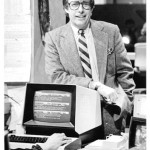
Eddie Sims Turner, better known as Ed Turner, was a Bartlesville native who came to OU in 1953 as a drama major, then a broadcast/speech major, and finally, at the urging of his fraternity brother and best friend, John Campbell, a journalism/broadcast major.
Too late to climb the editorial ladder at The Daily, he nonetheless joined the staff as a junior and when Campbell became editor their senior year, he persuaded his friend to give him his own column. His unparalleled wit and wisdom quickly made him a campus celebrity.
Graduating in 1957, he joined KWTV, Channel 9, in Oklahoma City as a news reporter, then went to the Metromedia station in Washington, D.C., where he developed ground-breaking newscasts. A succession of jobs, including as producer of the “CBS Morning News,” led him back to Channel 9 as news director.
Then, in 1979, came the call from a couple of former colleagues at Ted Turner’s fledging Cable News Network, in Atlanta. There, he served as executive vice president for most of his career. Despite overwhelming industry predictions of failure, the two Turners (no relation) made CNN an overwhelming success, garnering Peabodys and Emmys, as well as the Alfred I. DuPont Award.
CNN’s reorganization in 1997 sent Ed back to Washington. He left CNN a year later to become a fellow at the Freedom Forum, a media-oriented foundation. He died of cancer in 2002.
Ed never forgot OU or Oklahoma. His hires at CNN were replete with OU journalism graduates and other news broadcasters with Oklahoma ties — Neal Jones, ’62; Charles Hoff, ’67; Tony Clark, ’71; Pam Olson, ’72; Bella Shaw, ’76; Mike Boettcher, ’78; and many others.
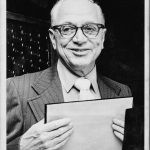
Ralph Sewell was the first Oklahoman to serve as national president of Sigma Delta Chi, now known as the Society of Professsional Journalists. He covered Oklahoma politics well into his 90s for the Oklahoma Press Association’s Capitol News Bureau, which he co-founded.
Sewell was born in Cardiff, Wales, and emigrated to the United States at the age of 13, his family settling in Oklahoma. As an OU student, he started out planning to earn a degree in engineering. But when he was asked to manage The Oklahoma Daily’s annual engineering edition, the journalism bug bit him. “I got the smell of printer’s ink and forgot about engineering,” Sewell once said. He served as co-editor of The Daily in the summer of 1933.
After graduating, Sewell went to work covering the oil industry for The Oklahoman. He eventually would become city editor, then city editor for the Oklahoma City Times, then assistant managing editor of both newspapers. In 1965, he was elected president of Sigma Delta Chi.
In 1973, with four decades of experience under his belt, Sewell joined the faculty of the OU School of Journalism as a visting professor. Sewell created the Legislative Reporting class, in which OU students cover the Oklahoma Legislature for newspapers across the state. He taught it for 11 years. He also launched a tradition of taking OU journalism students to cover the major parties’ presidential nominating conventions.
Upon his retirement from journalism in 2002, the Oklahoma House of Representatives honored Sewell with a resolution making note of “the accuracy, fairness, and appreciation for detail Ralph Sewell has brought to the journalism profession.”
Sewell died in 2004 at age 96.
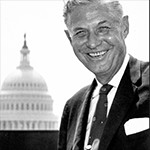
The first big campaign run by Almer Stillwell “Mike” Monroney? His historic bid in 1922 to be editor of The Oklahoma Daily.
In those days, the student body elected the Daily editor. And never had the students elected a sophomore to the post. That didn’t stop Monroney. In his platform he pledged “a lively newspaper, with no favoritism or propaganda for personal reasons.” Monroney won the race, by what the Daily reported to be a “comfortable majority.” It was the first of many election victories.
Mike Monroney had journalism experience before he even graduated high school, having worked as reporter for the Oklahoma City High School newspaper and part-time at the Oklahoma News and The Daily Oklahoman before heading to OU, where he earned a degree in economics with a minor in journalism.
Monroney went back to work for the News after graduation, covering crime and politics for four years before leaving to manage the family furniture store.
His political career began in 1938 with his election to the U.S. House of Representatives, where he served six terms. In 1950, he won a seat in the U.S. Senate, where he remained until he lost a re-election bid in 1968.
Monroney had one of the longest and most accomplished careers of any Oklahoma statesman, and today he is probably best remembered as having introduced the bill that created the Federal Aviation Administration in 1958. Another bill passed that year resulted in the informational stickers that are now required in the windows of cars for sale, which are to this day called “Monroney stickers.”
Monroney died in 1980 at age 77. Some of his ashes are interred at the FAA training center in Oklahoma City that bears his name.